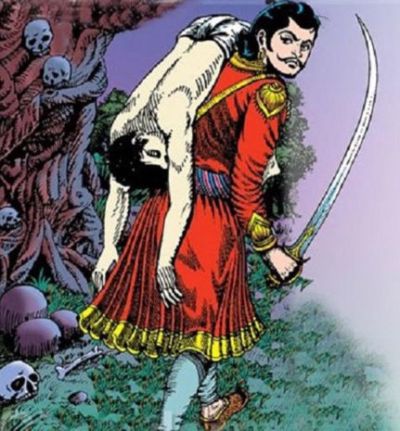Read the previous part here…
Now I have a question for you. Who should Mandāravatī take as her husband? Tell me, o wise king. Remember, if you know the answer, and don’t tell me the truth, your head will burst into a hundred pieces!

यः क्लेशम् अनुभूयापि मन्त्रेणैताम् अजीवयत् ।
पिता स तस्यास् तत्कार्यकरणान् न पुनः पतीः ॥ १२,९.३८ ॥
यश् चास्तीनि निनायास्य गङ्गायां स सुतो मतः ।
यस् तु तद् भस्मशय्यं ताम् आश्लिष्यासीत् तपश् चरन् ॥ १२,९.३९ ॥
श्मशान एव तत् प्रीत्या भर्ता तस्याः स उच्यते ।
कृतं तदनुरूपं हि तेन गाढानुरागिण ॥ १२,९.४० ॥
एवं नृपात् त्रिविक्रमसेनाच् छ्रुत्वैव मुक्तमौनात् सः ।
तस्य स्कन्धाद् अगमद् वेतालो ऽतर्कितः स्वपदम् ॥ १२,९.४१ ॥
King Vikram replied “He who restored her to life by the power of his mantras went through a lot of effort to bring Mandāravatī back to life…but he should be considered her father because he gave her life.
The Brahmin who took her asthi and went on a pilgrimage to the various tīrthas on the Ganga, should be considered her son, for a son performs such a ritual for his dead parent.
But the Brahmin who lived at the cremation ground, by living next to her ashes and practicing tapasya demonstrated his deep affection and love…these acts are those of a lover, and hence he alone is fit to be Mandāravatī’s husband.
When the Vetāla heard this, he laughed loudly and said “You are right, o king. You are absolutely right. Mandāravatī’ belongs to the Brahmin who stayed back at the cremation ground, and she should take him as her husband. But, King Vikram, you spoke, and I had told you not to speak…And so I am free!”
राजाथ भिक्ष्वर्थसमुद्यतस् तं
प्राप्तुं स भूयो ऽपि मनो बबन्ध ।
प्राणात्यये ऽपि प्रतिपन्नम् अर्थं
तिष्ठन्त्य् अनिर्वाह्य न धीरसत्त्वाः ॥ १२,९.४२ ॥
Saying this, the Vetāla flew back to where he had come from, with the king in hot pursuit…for men of character and firm resolve do not give up on a task that they have undertaken, even at the cost of their lives.
ततृीयो वतेालः
The third story
The king and the two wise birds
अथ भूयो ऽपि वेतालम् आनेतुं नृपसत्तमः ।
स त्रिविक्रमसेनस् तम् उपागाच् छिंशपातरुम् ॥ १२,१०.१ ॥
तत्रस्थम् एतं संप्राप्य मृतदेहगतं पुनः ।
स्कन्धे गृहीत्वैवागन्तुं तूष्णीं प्रववृते ततः ॥ १२,१०.२ ॥
प्रयान्तं च तम् आह स्म स वेतालो ऽस्य पृष्ठगः ।
चित्रं नोद्विजसे राजन् निशि कुर्वन् गमागमम् ॥ १२,१०.३ ॥
तद् अखेदाय भूयस् ते वर्णयामि कथां शृणु ।
अस्ति पाटलिपुत्राख्यं ख्यातं भूमण्डले पुरम् ॥ १२,१०.४ ॥
तत्रासीन् नृपतिः पूर्वं नाम्ना विक्रमकेसरी ।
गुणानाम् इव रत्नानाम् आश्रयं यं व्यधाद् विधिः ॥ १२,१०.५ ॥
तत्र शापावतीर्णो ऽभूद् दिव्यविज्ञानवाञ् शुकः ।
विदग्धचूदमणिर् इत्य् आख्यया सर्वशास्त्रवित् ॥ १२,१०.६ ॥
तेनोपदिष्टां सदृशीं राजपुत्रीं नृपात्मजः ।
मागधीम् उपयेमे स भार्यां चन्द्रप्रभाभिधाम् ॥ १२,१०.७ ॥
तस्या अपि तथाभूता सर्वविज्ञानशालिनी ।
शारिका सोमिका नाम राजपुत्र्याः किलाभवत् ॥ १२,१०.८ ॥
ते चैकपञ्जरस्थे द्वे तत्रास्तां शुकशारिके ।
सेवमाने स्वविञ्जानैर् दंपती तौ निजप्रभू ॥ १२,१०.९ ॥
एकदा साभिलाषस् तां शारिकां सो ऽब्रवीच् छुकः ।
एकशय्यासनाहारं सुभगे भज माम् इति ॥ १२,१०.१० ॥
नाहं पुरुषसंसर्गम् इच्छामि पुरुषा यतः ।
दुष्टाः कृतघ्ना इति सा सारिका प्रत्युवाच तम् ॥ १२,१०.११ ॥
न दुष्टाः पुरुषा दुष्टा नृशंसहृदयाः स्त्रियः ।
इति भूयः शुकेनोक्ते विवादो ऽत्रालगत् तयोः ॥ १२,१०.१२ ॥
कृतदासत्वभार्यात्वपणौ तौ शकुनी मिथः ।
निश्चयायाथ सभ्यं तं राजपुत्रम् उपेयतुः ॥ १२,१०.१३ ॥
स विवादपदं श्रुत्वा तयोर् आस्थानगः पितुः ।
कथं कृतघ्नाः पुरुषा ब्रूहीत्य् आह स्म शारिकाम् ॥ १२,१०.१४ ॥
ततः सा शृणुतेत्य् उक्त्वा निजपक्षप्रसिद्धये ।
पुंदोषाख्यायिनीम् एतां शारिकाकथयत् कथाम् ॥ १२,१०.१५ ॥
King Vikram went back to the banyan tree near the cremation ground, to fetch the Baitāl. When he reached, he found the corpse lying on the ground, groaning. King Vikram lifted the corpse, put it across his shoulders, and sent out once again to complete his task.
The Vetāla spoke once again ” O King! You are suffering a lot, going back and forth this way. Let me tell you another story to entertain you…listen carefully!”
There is a very famous city called Pāṭaliputra. In that city, many many years ago, lived a renowned king named Vikramakeśarin (a lion among brave men), who was a very virtuous and prosperous ruler. He had a parrot named Vidagdhacūḍāmaṇi (the crowning jewel of wisdom)…this parrot had godlike buddhi and knowledge of all the śāstras (scriptures), but had been born in bird form due to a curse from a previous birth.
Vikramakeśarin had a son named Sūryakānta ( the rays of the Sun). By the advice of the wise parrot, his marriage was solemnized with Candraprabhā (as beautiful as moonlight), the daughter of the king of Magadha.
Candraprabhā possessed a maina (magpie) named Somikā (moonlight)…now this maina was also renowned for her knowledge and wisdom. As the princess moved into the royal chambers of Sūryakānta, so did the maina move into the royal cage of Vidagdhacūḍāmaṇi.
In a few days, the parrot developed feelings for the maina, and said to her one day “Marry me, oh beautiful one, since we perch, feed and sleep in the same cage anyway…”
The maina replied “I do not intend nor desire to spend my moments with any male, since all males are wicked and ungrateful.”
The parrot didn’t like what he heard. “Wicked and ungrateful? Well, that is untrue! Instead, it is women who are wicked and cruel-hearted!”
And that is how the fight started…
Unable to reach a consensus, the two birds had an agreement. If the parrot won, he would have the maina as his wife, and if the maina won, she would have him as her slave. They both approached the prince and requested him to be the arbitrator in this dispute.
Prince Sūryakānta addressed the maina first. “Tell me Somikā, why do you say that males are ungrateful?”
The maina replied…
to be continued…
